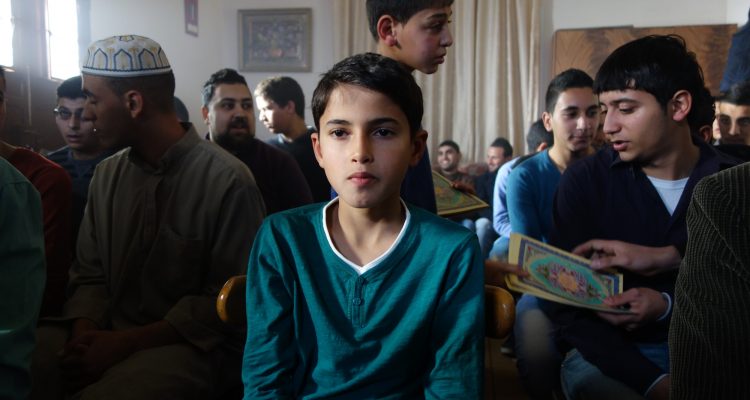If it weren’t for its setting and its message, “The Idol” might appear to be an entirely standard musical biopic. On its surface, this movie about the life of “Arab Idol” winner Muhammad Assaf will be familiar to anyone who has seen an episode of the show’s British or American predecessors, a biographical drama, or “Walk Hard: The Dewey Cox Story.” The Palestinian film begins with the singer’s childhood, offering glimpses of talent to come and a galvanizing tragedy, then it transitions into adult attempts at fame. There are also the requisite montages of training and performances. But what sets Hany Abu-Assad’s film apart is that its protagonist lives in Gaza, and his experience as a Palestinian both informs his journey toward stardom and how viewers react to him.
READ MORE: Watch: All The Clips & Trailers From The 2016 Cannes Film Festival Winners
Beginning in Gaza in 2005,”The Idol” introduces us to Muhammad (played as a child by Qais Atallah), who sings lead in a band that also includes his spirited sister Nour (Hiba Atallah) and friends Ahmad (Ahmad Qassim) and Omar (Abd-Elkarim Abu-Barakeh). When they’re not busy tearing through the unpaved streets or playing soccer, they’re giving a concert for a small crowd of adoring, swaying children. A frustrated adult yells, “People are dying, and you’re singing?” but Mohammad and his band rise above the turmoil and violence around them, scraping together money for instruments, and booking gigs at weddings. But even though they’re able to push past the struggles of their environment, a death in the family gives Muhammad even more desire to share his singing with the world.
 The film fast forwards to 2012, where portions of Gaza have been reduced to rubble. Muhammad (now played by Tawfeek Barhom) desperately wants to escape Gaza, leading him to try out for “Arab Idol,” though the auditions are in Cairo, Egypt, where he cannot legally travel. He is able to cross the border, but obstacles continue to block his path to achieving his dream. As he moves through the show’s competition stages, he becomes a beacon of hope for Palestinians and others in the Arab world.
The film fast forwards to 2012, where portions of Gaza have been reduced to rubble. Muhammad (now played by Tawfeek Barhom) desperately wants to escape Gaza, leading him to try out for “Arab Idol,” though the auditions are in Cairo, Egypt, where he cannot legally travel. He is able to cross the border, but obstacles continue to block his path to achieving his dream. As he moves through the show’s competition stages, he becomes a beacon of hope for Palestinians and others in the Arab world.
Less overtly political than Abu-Assad’s Oscar-nominated films “Omar” and “Paradise Now,” “The Idol” is at once specific to its protagonist’s experience and a human narrative that moves beyond the larger conflict in Gaza and Palestine. It doesn’t show bombs exploding or fighters using weapons at the border. Instead, this movie focuses on the challenges of individual people who exist in the midst of the conflict and how it affects their ability to realize their hope. For many English-language viewers, this trauma may feel foreign, but cloaking it in the familiar tale and the well-known tones of the ‘Idol’ theme helps to translate Muhammad’s experience.
 Abu-Assad makes the interesting directorial choice not to subtitle any of Muhammad’s songs. Though it is at first disconcerting when the Arabic-language singing doesn’t include a translation, the decision allows the audience to fully concentrate on the strength and beauty of Atallah and Barhom’s voices. The songs are often performed with great emotion, and those feelings are communicated to the audience without any need for words. Even though viewers may know the film’s ending due to the widely seen and well publicized results of the 2013 season of “Arab Idol,” the climax is still a triumphant and touching moment for the more sensitive members of the audience (I’m not crying. You’re crying.).
Abu-Assad makes the interesting directorial choice not to subtitle any of Muhammad’s songs. Though it is at first disconcerting when the Arabic-language singing doesn’t include a translation, the decision allows the audience to fully concentrate on the strength and beauty of Atallah and Barhom’s voices. The songs are often performed with great emotion, and those feelings are communicated to the audience without any need for words. Even though viewers may know the film’s ending due to the widely seen and well publicized results of the 2013 season of “Arab Idol,” the climax is still a triumphant and touching moment for the more sensitive members of the audience (I’m not crying. You’re crying.).
For how bold Abu-Assad’s previous work has often felt, “The Idol” rarely strays from its formula. It doesn’t offer any deeper of a look into Muhammad’s soul than you’d get in a magazine profile. Practically everyone else in the film other than his sister Nour is given little characterization, even Muhammad himself. It seems content to skim the surface of the singer’s story. In its first act, it’s filled with hope and charm thanks to the child actors and a lighter tone. But as the movie progresses, it alternates between moments of sadness with ones intended to make the audience cheer.
 For all its safe choices and standard narrative, “The Idol” succeeds in communicating its message that the Palestinian people deserve a voice and representation. Its most powerful images somehow aren’t shots of Muhammad’s wonderful singing; instead, it’s the reactions of the Palestinians to those performances and cheering on one of their own. [B-]
For all its safe choices and standard narrative, “The Idol” succeeds in communicating its message that the Palestinian people deserve a voice and representation. Its most powerful images somehow aren’t shots of Muhammad’s wonderful singing; instead, it’s the reactions of the Palestinians to those performances and cheering on one of their own. [B-]

